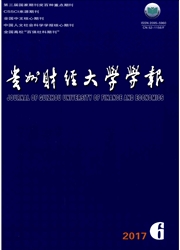

 中文摘要:
中文摘要:
论文以1999-2009年的省际面板数据为样本,对人口年龄结构、财政影响与高储蓄率的关系进行了实证分析。研究发现:(1)影响我国高储蓄率的主要因素不是人口年龄结构,而是经济体的转型特征。(2)人口年龄结构对我国储蓄率的影响存在着明显的城乡差异,其中少儿抚养比对城镇居民储蓄率的影响为负,而对农村居民储蓄率的影响为正:老年抚养比对城镇居民储蓄率的影响为正,而对农村居民储蓄率的影响为负。(3)财政收支比重对城乡居民储蓄率的影响也存在着明显的差异,税收规模对城镇居民储蓄率的影响为正,而对农村居民储蓄率的影响为负;支出规模对城镇居民储蓄率的影响为负,而对农村居民储蓄率的影响为正。上述发现对于中国未来的改革取向具有重要的启示。
 英文摘要:
英文摘要:
This paper uses the sample of provincial panel data for 1999--2009 to make an empirical study of the relationship between population age structure, fiscal effect and high saving rate. The findings are as follows : ( 1 ) The main determinant of high saving rate in China is not population age structure, but the transitional features of the Chinese economy. ( 2 ) There is a distinct urban-rural difference in the effect of population age structure on saving rate, in that child dependency ratio has a negative impact on urban household saving rate and a positive one on rural saving rate, while old-age dependency ratio has a positive impact on urban household saving rate and a negative one on rural saving rate. ( 3 ) There is also a marked disparity in the effect of the share of fiscal revenue and expenditure on household saving rate. The scale of taxation has a positive effect on urban saving rate and a negative one on rural saving rate, while the scale of expenditure has a negative effect on urban saving rate and a positive one on rural saving rate. The above findings provide important reference for China' s future reform.
 同期刊论文项目
同期刊论文项目
 同项目期刊论文
同项目期刊论文
 期刊信息
期刊信息
